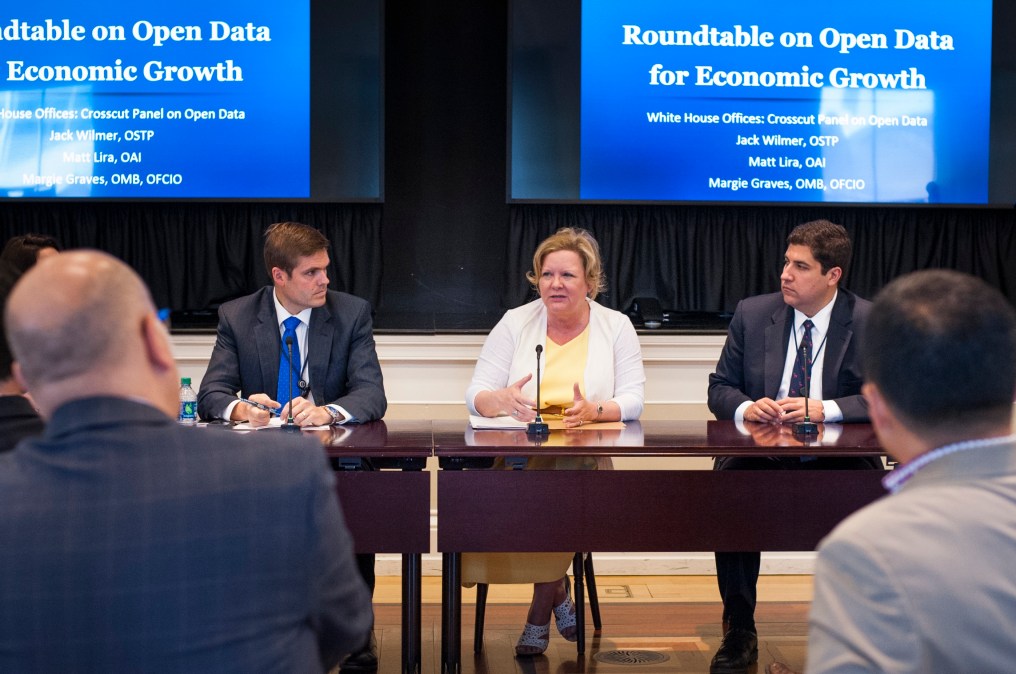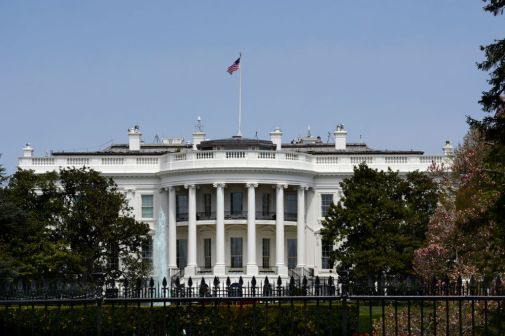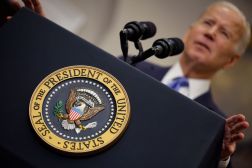Open data for economic growth: A priority for the Trump administration

Open government data — data that anyone can use, reuse and republish — has been recognized as a major economic resource. Studies of different sectors, including the health care, geospatial, weather and information industries, have shown that the private sector uses U.S. federal data to create hundreds of billions of dollars in revenue.
For several years, open data has been a cross-agency priority for the federal government — and since the election, it has been clear that open data can also support the goals of the Trump administration. A continued commitment to open government data can help make government more efficient and effective, benefit the economy, and create jobs.
On July 25, the Office of Management and Budget and the Center for Open Data Enterprise co-hosted a Roundtable on Open Data for Economic Growth to help realize that potential. As one of the Trump administration’s first events focused on leveraging the nation’s data resources, this roundtable brought together almost 80 government and business leaders. The goal: to “connect government and private-sector leaders to use open data as a strategic resource for better government and growing the American economy.” The roundtable used a methodology that the Center for Open Data Enterprise has developed over three years to help the White House, federal agencies and their data users work together to improve open data.
By co-hosting this roundtable, and by bringing in speakers from top leadership, the White House showed its commitment to open data as a national resource. The event included talks by OMB Director Mick Mulvaney, Deputy U.S. CTO Michael Kratsios, and Chris Liddell, director of the American Technology Council. OMB Senior Policy Analyst Kristen Honey, who led the roundtable, also moderated a panel with acting Federal CIO Margie Graves, Matt Lira of the Office of American Innovation and Jack Wilmer of the Office of Science and Technology Policy. With the support of its open data partners, Accenture Federal Services and Booz Allen Hamilton, the Center for Open Data Enterprise also convened business leaders from companies across sectors that rely on government open data for their business.
The roundtable focused on two issues: developing a better enabling environment for the use of open data and identifying high-value data sets for business use. A future FedScoop article will describe data that participants prioritized for five business sectors: consumer and retail, finance, geospatial, health care, and transportation. A full report on the roundtable is available here.
The White House speakers and panelists shared their insights and plans for improving the open data ecosystem to make government data a more powerful resource. Their remarks provided valuable insights into how the Trump administration sees the value of open data for economic growth and plans to realize that value. Administration officials described open data opportunities in three areas: supporting business, improving government and building collaboration. (The roundtable was held under the Chatham House Rule, which prohibits quoting participants directly.)
Supporting Business
As part of the administration’s commitment to economic growth and jobs, business needs should be an important part of prioritizing data sets. Government open data programs will have to set priorities, and as one official said, government data stewards will need to “find a way to elicit feedback from industry [and] entrepreneurs . . . as opposed to just looking across government and saying, ‘Let’s open everything up.’” Federal leadership is also interested in identifying “other data sets within the federal government which could potentially help drive companies’ growth,” beyond the ones that are now being put to use.
Government officials also noted a particular business opportunity: the potential to develop new commercial ventures to serve citizens using open government data. A high priority for this administration is to improve services to American citizens through both government and private-sector efforts. There’s general agreement that the U.S. government does not deliver public services with the same quality that the private sector is now able to do in areas like transportation, shipping and communication. In order to “create world class citizen services,” government and the private sector need to work together. The federal government can focus on improving a select number of high-priority services that only government can deliver and can open up government data for the private sector to use in building other new, innovative services for citizens.
Improving Government
Several government representatives noted that improving open data should be a key part of IT modernization. As one government official put it, it’s important for agencies to “think about the data that is most likely to be relevant and useful and interesting to be shared and make sure that as you modernize your systems you base the technical architecture and the infrastructure around that.”
Through modernization, open data policy must be tied to cybersecurity to ensure that data is released with appropriate protections. The administration is investigating blockchain as a tool to make data public in a secure way.
OMB and this administration are committed to implementing the DATA Act — legislation that is bringing unprecedented detail and clarity to federal spending data. The DATA Act is a pillar of government open data policy, and has been called the most important open data legislation since Congress passed the Freedom of Information Act in the 1960s.
Building Collaboration
Administration officials see open data as both a demand-driven and a government-led movement. There is already a strong open data community of public-sector, private-sector and independent data enthusiasts. When their commitment is matched by equally strong support from high levels of government, as one speaker put it, “really transformative things can happen.”
Overall, this roundtable itself was a recognition that government and the private sector must work together to realize the potential held in the vast resources of federal data. As one speaker put it, this administration recognizes “the unique power of government data to enable entrepreneurial market activity,” and is committed to making government data available for business use. And government officials are interested in collaborating with the private sector in ways that will be mutually beneficial. The Roundtable on Open Data for Economic Growth was an example of the new ideas and directions this collaboration can produce.
Joel Gurin is President of the Center for Open Data Enterprise in Washington, D.C. The center thanks its Open Data Partners, Accenture Federal Services and Booz Allen Hamilton for supporting the center’s work on the 2017 Open Data Roundtables.




